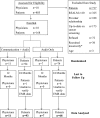Comparative effectiveness of audit-feedback versus additional physician communication training to improve cancer screening for patients with limited health literacy
- PMID: 24590734
- PMCID: PMC4099465
- DOI: 10.1007/s11606-014-2782-4
Comparative effectiveness of audit-feedback versus additional physician communication training to improve cancer screening for patients with limited health literacy
Abstract
Background: We designed a continuing medical education (CME) program to teach primary care physicians (PCP) how to engage in cancer risk communication and shared decision making with patients who have limited health literacy (HL).
Objective: We evaluated whether training PCPs, in addition to audit-feedback, improves their communication behaviors and increases cancer screening among patients with limited HL to a greater extent than only providing clinical performance feedback.
Design: Four-year cluster randomized controlled trial.
Participants: Eighteen PCPs and 168 patients with limited HL who were overdue for colorectal/breast/cervical cancer screening.
Interventions: Communication intervention PCPs received skills training that included standardized patient (SP) feedback on counseling behaviors. All PCPs underwent chart audits of patients' screening status semiannually up to 24 months and received two annual performance feedback reports.
Main measures: PCPs experienced three unannounced SP encounters during which SPs rated PCP communication behaviors. We examined between-group differences in changes in SP ratings and patient knowledge of cancer screening guidelines over 12 months; and changes in patient cancer screening rates over 24 months.
Key results: There were no group differences in SP ratings of physician communication at baseline. At follow-up, communication intervention PCPs were rated higher in general communication about cancer risks and shared decision making related to colorectal cancer screening compared to PCPs who only received performance feedback. Screening rates increased among patients of PCPs in both groups; however, there were no between-group differences in screening rates except for mammography. The communication intervention did not improve patient cancer screening knowledge.
Conclusion: Compared to audit and feedback alone, including PCP communication training increases PCP patient-centered counseling behaviors, but not cancer screening among patients with limited HL. Larger studies must be conducted to determine whether lack of changes in cancer screening were due to clinic/patient sample size versus ineffectiveness of communication training to change outcomes.
Figures
Comment in
-
Capsule commentary on Price-Haywood et al., comparative effectiveness of audit-feedback versus additional physician communication training to improve cancer screening for patients with limited health literacy.J Gen Intern Med. 2014 Aug;29(8):1162. doi: 10.1007/s11606-014-2823-z. J Gen Intern Med. 2014. PMID: 24664439 Free PMC article. No abstract available.
References
-
- Healthy People 2010: Understanding and Improving Health. 2. Washington, DC: U.S: Government Printing Office; 2000.
Publication types
MeSH terms
Grants and funding
LinkOut - more resources
Full Text Sources
Other Literature Sources
Medical


